
Netherland Dwarf
Conditions of detention
Requires a small, cozy cage with soft bedding and plenty of hiding spots.
Useful Fact: Due to their small size, they need less space but benefit greatly from time outside the cage for exercise.
Nutrition and diet
Hay should make up the majority of their diet, supplemented with fresh vegetables and a small amount of rabbit pellets
Useful Fact: Due to their small size, be cautious with treats to avoid obesity
Health
Prone to dental issues due to their small jaws and respiratory problems
Useful Fact: Regular check-ups with a vet are essential to prevent overgrown teeth
Grooming and care
Requires minimal grooming but benefits from regular brushing to remove loose fur
Useful Fact: Regular nail trimming is important as their nails can grow quickly and cause discomfort
Education and training
Can be litter-trained with patience and consistency
Useful Fact: Use positive reinforcement such as small treats to encourage good behavior
Toys and entertainment
Enjoys chew toys, tunnels, and small balls
Useful Fact: Regular playtime outside the cage helps prevent boredom and stress
Safety
Keep away from small objects they could choke on and avoid rough handling due to their delicate structure
Useful Fact: Always supervise interactions with other pets to prevent accidents
Accessories
A small litter box, water bottle, and chew toys
Useful Fact: A hideaway or small house in the cage can make them feel secure
Socialization
Generally shy but can become affectionate with gentle handling
Useful Fact: Early socialization is key to developing a trusting relationship
Travel and Transportation
Use a small, secure carrier lined with soft bedding
Useful Fact: They can get stressed easily, so keep travel time short and the environment calm
Behavior and psychology
Typically calm but can be nervous around new people or environments
Useful Fact: Understanding their need for a quiet, stable environment helps in reducing stress
Legal aspects
Ownership is generally unrestricted, but it’s important to check local laws if you plan to breed or sell them
Useful Fact: Always acquire rabbits from reputable breeders to ensure they are healthy and well-socialized


